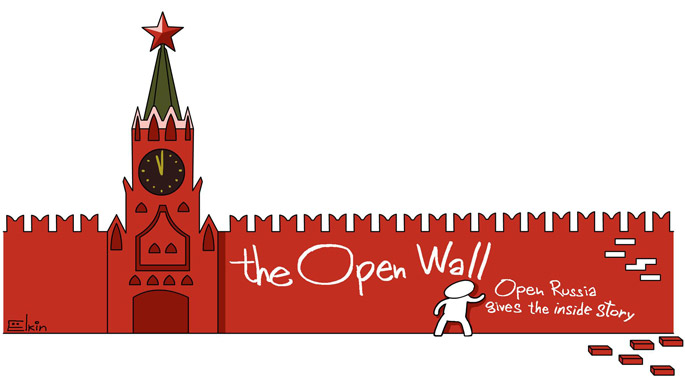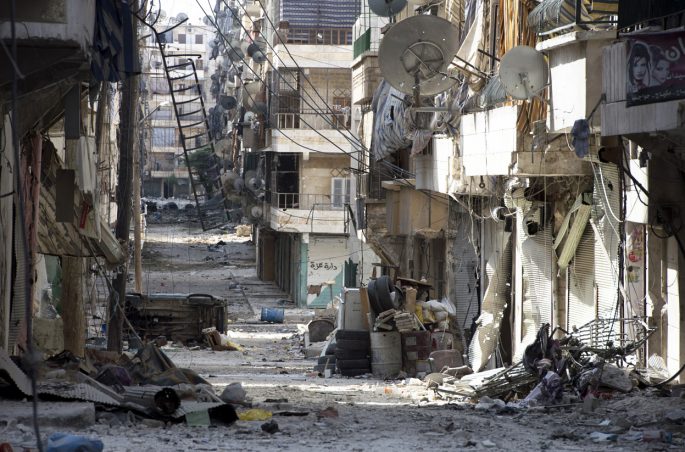Aleppo

Aleppo
The long-suffering Syrian city of Aleppo will be forever associated with faraway Russia.

In Aleppo, the memory will last for generations to come. In Russia itself, however, the public reaction to Aleppo is rather more muted. Although the city’s fate will be decided by the Kremlin, most Russians view the conflict as peripheral, yet another made-for-TV war, with no direct bearing on their lives.
According to a survey by the Levada Center in late October, only 18% of Russians keep up with the latest developments in Syria, yet 52% say they support Russian air strikes. At the same time, 48% of respondents are worried that worsening relations between Russia and the West over Syria could escalate into WW3.
Russians have no objective knowledge about Syria whatsoever. Russian state channels do most of the reporting from the country, while liberal media try to balance things by airing the Western point of view. Hence, virtually any event receives multiple interpretations, and shaping a coherent view becomes tricky. Some, for example, believe that Russia is capable of bombing a UN humanitarian convoy at Aleppo and then covering its tracks. Conflict Intelligence Team investigators know better: “The Russian Defence Ministry claims ‘there are no signs that the convoy was hit by artillery fire,’ but in actual fact there are plenty of holes caused by high-power weapons, not only in the vehicles, but in the boxes of medical supplies at the Syrian Red Crescent’s nearby warehouse.”
Others, however, believe that the West is falsely accusing the Kremlin, and that Russia played no part in the demolition of the convoy.
Dobrov: “Syria is full of shrapnel from Russian bombs. You can easily move some to where the convoy was hit and take a photo. And you can just as readily dump a shrapnel-riven Toyota at the site.”
In this post-truth, photoshopped world, facts are replaced by ideological prejudice. When Angela Merkel describes the strikes on Aleppo as “inhuman,” and Francois Hollande calls Russia’s actions in Syria a “genuine war crime,” Runet users usually have something to say to Europe’s leaders in response.
1mr.strannik-3: “And what did Germany, France and the US do in Syria four years ago? The time has come to help the opposition overthrow the governments of Germany and France. Let them be replaced by people who don’t suck up to Washington.”
opiatnovyi63: “Merkel and Hollande are like children! They still don’t understand who they’re dealing with! Our Leader is again running rings round them! Nothing will be left of Aleppo, it will be razed to the ground…”
There is a third way for Russians to respond – close your eyes and ears, and pretend that nothing is happening in Syria. As the opinion polls reveal, that’s the approach adopted by the vast majority of Russians: some are guided by sheer indifference; some are blinkered by their own problems, while others have walled themselves off because the topic is so caked in propaganda..
Over the past two and a half months, for instance, not a single episode of Dmitry Kiselyov’s Vesti Nedeli (News of the Week) has failed to mention Aleppo. And it is patently clear that the presenter is not just retelling the events, but has been preparing his audience for an inevitable assault on Syria’s largest city.
With minor variations, each programme has drip-fed the audience the same story:
1) Alongside Assad, Russia is the only force that is conscientiously battling international terrorism in Syria. America is forever in breach of its agreements (“does not separate the moderate opposition from the radicals”) and openly supports the terrorists (“US drones have carried out strikes against wounded Syrian soldiers”).
2) There is no moderate opposition – all those trapped in eastern Aleppo are all-out terrorists: “According to the Russian Defence Ministry,” reports Kiselyov, “shelling by moderate [forces] killed almost 13,000 civilians from February to September.” Not only that: “The West is turning a blind eye to the moderate opposition’s slaughter of children.”
3) The Russian military in Syria is going from strength to strength. “The boldness of our military operation has stunned the world. No one expected such thorough preparation and precise execution,” said Kiselyov (the prevailing Western view of the “boldness” and “precision” of the Russian bombing is something that Vesti Nedeli prefers to ignore). Kiselyov labels accusations of Russian involvement in the strike against the UN humanitarian convoy outside Aleppo as “misinformation,” “paranoia” and a “murky provocation” that “smacks of a frame-up or crude fabrication.” In his view, the Syrian boy Omran, pictured head-to-toe in ash, dust and blood, was also part of the global campaign to smear Russia: “The worse it gets for the militants in eastern Aleppo, the more Western news agencies spread the choreographed images of the radicals.”
4) Western countries that accuse the Kremlin of war crimes are war criminals themselves. For instance, Britain has blood on its hands in Iraq, the United States likewise (plus Libya, Afghanistan and Vietnam), and all NATO members are complicit in the 1999 bombing of Yugoslavia.
The Kremlin propaganda machine likes to compare its operation in Syria with the US-backed operation in the Iraqi city of Mosul. Here, all the charges levelled at the Russians in Syria are redirected at the Americans.
About Aleppo: “Local forces are operating with care.”
About Mosul: “Artillery and aircraft are hitting residential areas indiscriminately across huge areas. Civilian casualties number in the hundreds.”
About Aleppo: “Since 18 October Russian planes have flown no closer than 10 km to Aleppo.”
About Mosul: “The Americans have bombed the outskirts of Mosul, including a school and residential areas.”
In such a situation, when even humanitarian aid is in the firing line, who’s to say that we haven’t all been brainwashed, whatever position we hold.



